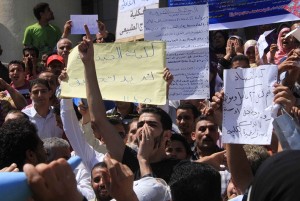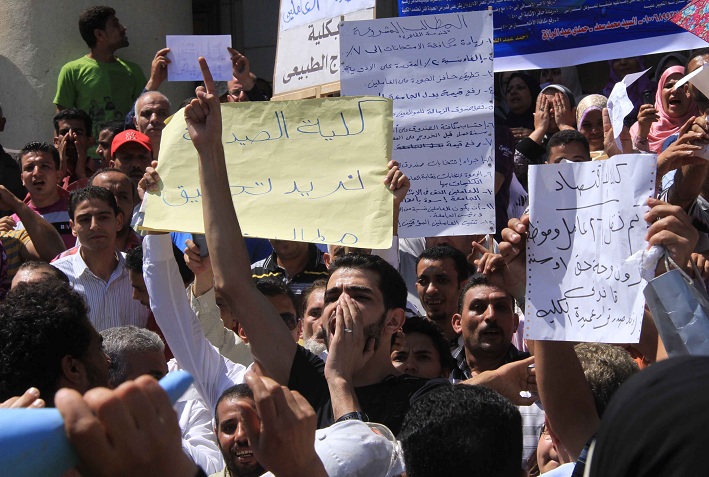
Two leading independent workers syndicate movements announced on Monday the forming of the National Front for Defending the Workers’ Rights and Syndicates’ Freedoms to push for the implementation of a new syndicates’ freedoms law.
The Egyptian Union of Independent Syndicates (EUIS) and Democratic Conference of Independent Syndicates (DCIS) launched the union at a press conference held at the Leadership Development Center for Business Administration, in coordination with a number of leftist and democratic political parties including; Al-Dostour party, the Egyptian Social Democratic Party, the Karama party the Taggamu party.
“It’s unfair for those who believe in the same idea to fight for it separately,” Head of EUIS Kamal Abu Eitta said in the press conference. “We hereby call upon all political parties and revolutionary youth to follow in our footsteps and unite.”
Head of DCIS, Kamal Abbass, was among those who spoke in the press conference.
“It’s impossible to achieve social justice without giving workers their rights,” Abbass said, “and workers, in turn, won’t be capable of taking their rights in the absence of independent democratic syndicates.”
The newly-founded union set a number of goals it wishes to achieve; the cancellation of law 35 for the year 1976 and having it replaced with a syndicates freedoms law, issuing of a just system for wages where the maximum wage doesn’t surpass 15 times the minimum wage, and addressing the “savage attack” workers and their independent syndicates’ leaders are currently being subjected to.
Abu Eitta stated that the number of currently suspended workers and syndicate members surpasses the number during former President Hosni Mubarak’s era. He furthermore accused Minister of Manpower Khaled Al-Azhary of being an enemy to the Egyptian workers.
Abbass also mentioned Al-Azhary in his statements, claiming that he was appointed upon instructions from the Muslim Brotherhood’s Guidance committee, adding that striking independent syndicates is an integral part of his agenda.
“We refuse replacing the National Democratic Party (NDP)’s dominance over syndicates with that of the Muslim Brotherhood,” Abbass said.
Al Azhary was an active Brotherhood member who ran for the workers’ seat of the 2010 parliamentary elections before the January 2011 revolution.
“Al-Azhary calls independent syndicates ‘illegitimate syndicates’,” Abbass said, “the illegitimate syndicates are those which come about against the workers’ will; where the fees of the syndicates are forcefully subtracted from their wages and not collected upon their will.”
The head of the Socialist Popular Alliance Party (SPAP), Abdel Ghaffar Shokr, stated that Al-Azhary was the one who refused issuing the syndicates’ freedoms law drafted by Ahmed Al-Bor’ei, deputy head of Al-Dostour party. Al-Bor’ei had drafted the law while he was minister of manpower in Essam Sharaf’s cabinet.
“The syndicates’ freedoms law was approved in September 2011,” Al-Bor’ei said, “only to be stocked in the Supreme Council of Armed Forces drawer, then the Peoples’ Assembly’s drawer and now in the drawer of the Ministry of Manpower.”
“The syndicates’ freedoms law will benefit all syndicates and not just meet special demands,” EUIS member Hoda Kamel said, adding that the new union between the EUIS and the DCIS would help push for the issuance of Al-Bor’ei’s syndicates’ freedoms law. Kamel is from the pensioners’ solidarity syndicate.
The Muslim Brotherhood have drafted a separate syndicates’ freedoms law which it submitted to the Manpower committee in the now dissolved 2011 Peoples’ Assembly. The syndicates’ freedoms’ campaign, a campaign led by independent syndicate members, created a comparison between both laws. The comparison suggests that the Muslim Brotherhood’s law falls short in many matters that have to do with syndicates’ freedoms when weighed against Al-Bor’ei’s law.
The Brotherhood’s law allows all workers to organise syndicates except those working in the police, the military or professionals such as teachers. The Brotherhood’s law also prevents any worker who withdraws from the official syndicate from collecting any money they had consigned to special funds upon retirement. It also doesn’t provide equal treatment to workers and employers; workers are fined with a EGY 10,000 penalty if they provide incorrect information, while employers are fined with a penalty ranging from EGY 1000 to EGY 5000 should they prevent syndicates members from holding meeting or elections as well as for firing syndicate board of directors’ members. The law allows the Ministry of Manpower to interfere in the syndicates’ affairs.
The front represents solidarity with a campaign launched two months ago by independent syndicates to defend the rights and freedoms of workers and prevent intransigence exercised against syndicate members.
Syndicate members have been lately very active in staging strikes demanding full rights such as the transport workers’ strike, the teachers’ strike and the doctors’ strike.


